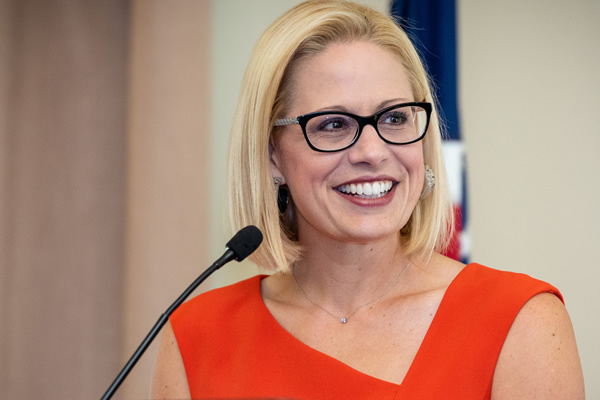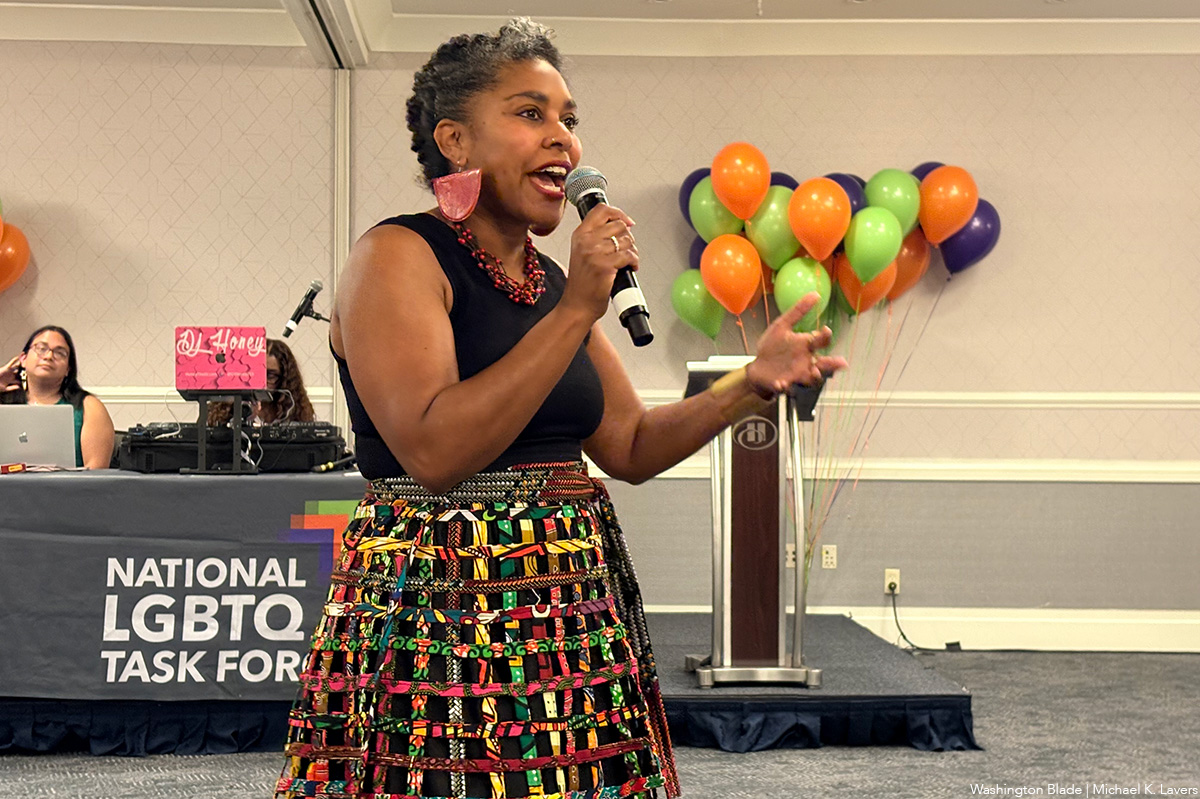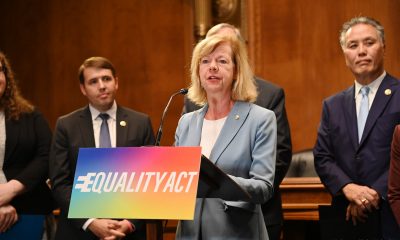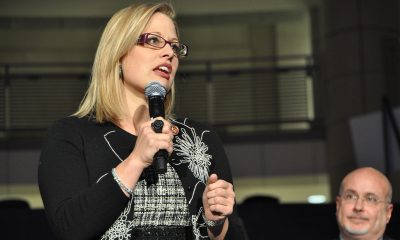News
How do you solve the Kyrsten Sinema problem?
Bisexual senator absent from WH Pride reception

Attendees of the White House reception for Pride month last week included high-profile LGBTQ leaders from activist groups, state legislatures, and the federal government. One lawmaker, however, was conspicuously absent.
Sen. Kyrsten Sinema (D-Ariz.), the only out bisexual in Congress, didn’t attend the event — an absence that stood out as members of the House LGBTQ Congressional Equality Caucus were there. Sen. Tammy Baldwin (D-Wis.), Sinema’s LGBTQ companion in the Senate, also showed up and was in the front row for President Biden’s remarks.
When the Washington Blade reached out to Sinema’s office to ask why the senator skipped the reception, her staff confirmed she had been invited.
“Kyrsten was invited, but was unable to attend as the Senate had recessed Thursday evening for state work period,” said Hannah Hurley, a Sinema spokesperson.
But the Senate recess didn’t stop Baldwin from attending the Pride reception.
It’s not the only event Sinema has skipped in recent weeks. When Vice President Kamala Harris hosted a dinner at the White House for all women members of the Senate, Sinema was the only Democrat not in attendance.
The absence of Sinema is almost metaphorical as she has become the target of ire for progressives who view her as an obstructionist to their agenda in the Senate.
Sinema, as she articulated in a recent op-ed for the Washington Post, has come out in strong defense of the filibuster in the Senate, which has been criticized as a relic of structuralism racism (although she’s not the only Senate Democrat to oppose dropping the filibuster).
“It’s no secret that I oppose eliminating the Senate’s 60-vote threshold,” Sinema writes. “I held the same view during three terms in the U.S. House, and said the same after I was elected to the Senate in 2018. If anyone expected me to reverse my position because my party now controls the Senate, they should know that my approach to legislating in Congress is the same whether in the minority or majority.”
As a result of her position, Sinema has been accused of holding up key legislation like the Equality Act, which would expand LGBTQ protections under the law. (It should be noted the bill as it stands doesn’t have unanimous support in the Democratic caucus and wouldn’t even pass without the filibuster on a majority vote.)
Also, the dramatic thumbs down she gave on the Senate floor on an amendment to raise the minimum wage to $15 an hour was interpreted as an insult to progressives pushing for the increase.
The transition for Sinema is remarkable. Starting her political career for the Arizona Legislature as a Green Party candidate who once dressed up in a tutu to oppose the Iraq war, Sinema’s latest incarnation as a conservative Democrat has some of her one-time supporters scratching their heads.
That will make things complicated for LGBTQ advocacy groups like the Human Rights Campaign and the LGBTQ Victory Fund, which have endorsed her efforts to win election, and for Democrats who sold her as the only out bisexual in Congress.
Sinema, after winning election in 2018 to a six-year term, will be in the Senate for a while and won’t face re-election until 2024. But progressives are already clamoring for LGBTQ advocacy groups to take a hard line with her regarding any future support.
Michelangelo Signorile, a progressive activist and Sinema critic, went so far in an email to the Blade as to say LGBTQ groups should withhold their endorsements entirely from Sinema.
“LGBTQ groups definitely shouldn’t be endorsing anyone blocking the Equality Act from being passed. Right now that includes every Republican and Joe Manchin and Kyrsten Sinema, who refuse to eliminate the filibuster,” Signorile said. “So of course they shouldn’t endorse her. How could the Human Rights Campaign or Victory Fund have any credibility while telling the community to invest hard-earned dollars with this politician?”
Sinema has always taken a one-foot-in, one-foot-out approach to her sexual orientation as a political figure. Accepting endorsements from LGBTQ groups, Sinema has attended events after her election hosted by them, such as an event with new LGBTQ members of Congress upon her election to the U.S. House in 2012. But Sinema has dodged questions about her bisexuality, telling the Washington Post in 2013 she doesn’t understand “why it’s big deal.”
The LGBTQ Victory Fund, for its part, is putting a degree of distance between itself and Sinema in response to inquires from the Blade, but not repudiating its support for her entirely.
Elliot Imse, a Victory Fund spokesperson, said his organization endorsed Sinema when the choice for Arizona voters was between her and “the anti-LGBTQ Republican candidate Martha McSally.”
“She is not currently endorsed by Victory Fund and we won’t be considering 2024 endorsements until summer 2023 – and much will happen between now and then,” Imse said. “As with all our incumbent candidates, the Victory Campaign Board will review her efforts to advance equality while in office as it is a key criteria for our endorsement.”
In response to an inquiry on whether the Victory Fund has reached out to Sinema about her policy positions, Imse said that would be inconsistent with his organization’s mission.
“Victory Fund has a very clear mission and we believe organizations are most successful when they remain laser-focused on that mission – so we do not take positions on specific policy or procedural questions,” Imse said. “We endorse and support LGBTQ candidates who will fight for and advance equality legislation and policies once in office and the LGBTQ members of Congress we’ve helped elect are the most outspoken and passionate voices on the Equality Act and other LGBTQ rights legislation.”
Having that “laser-focus,” however, isn’t true for other LGBTQ political groups, which do both endorsements and lobbying before Congress. Chief among them is the nation’s largest LGBTQ group, the Human Rights Campaign.
The Human Rights Campaign, however, didn’t respond to multiple requests for comment on Sinema or any discussions the organization has with her. That silence, however, likely won’t be enough for progressive activists angered with Sinema.
Signorile said Sinema’s absence from the White House should be seen as a red flag for LGBTQ advocacy groups on any future support.
“Sinema, by not attending Pride at the WH, doesn’t even make herself visible there. It’s almost like she wants to distance herself from being part of the community,” Signorile said. “She never talks about being bisexual, doesn’t discuss her coming out story — even if you ask her — and I defy anyone to find me a recent time in which she’s discussed being part of this community.”
World
Companies participate in ‘Pride on the Promenade’ at World Economic Forum
GLAAD co-organized initiative

A dozen companies that are participating in the World Economic Forum on Wednesday lit up their venues on the Davos promenade in rainbow colors.
Amazon, Axios, Bloomberg, Circle, Cisco, Cloudflare, Edelman Trust House, Hub Culture, Salesforce, SAP, Snowflake, and Workday participated in the “Pride on the Promenade” that GLAAD, Open for Business, and the Partnership for Global LGBTIQ+ Equality organized. It is the fourth year the organizations have organized the initiative during the World Economic Forum.
The annual event is taking place this week in the Swiss ski resort town of Davos.
GLAAD CEO Sarah Kate Ellis on Wednesday moderated a panel in which Open for Business CEO Ken Janssens and Iris Bohnet, co-director of the Harvard Kennedy School’s Women and Public Policy Program, among others, participated. President Donald Trump earlier in the day spoke at the World Economic Forum.
“World leaders, corporate executives, and global media are discussing new ways to evolve inclusion and social issues, but leaders in those institutions and our community as a whole need to do more to support LGBTQ people globally,” said Ellis in a statement that GLAAD sent to the Washington Blade on Thursday. “At a time when decades-old alliances are being challenged, the importance of this visible show of solidarity at the largest convening of global decision makers cannot be understated. Inclusion remains a necessary business practice and companies that demonstrate shared values of family and freedom know this helps grow the bottom line.”
Virginia
LGBTQ rights at forefront of 2026 legislative session in Va.
Repeal of state’s marriage amendment a top priority

With 2026 ramping up, LGBTQ rights are at the forefront of Virginia politics.
The repeal of Virginia’s constitutional amendment that defines marriage as between a man and a woman is a top legislative priority for activists and advocacy groups.
The Virginia Senate on Jan. 17 by a 26-13 vote margin approved outgoing state Sen. Adam Ebbin (D-Alexandria)’s resolution that would repeal the Marshall-Newman Amendment. The Virginia House of Delegates earlier this month passed it.
Two successive legislatures must approve the resolution before it can go to the ballot.
The resolution passed in 2025. Voters are expected to consider repealing the amendment on Nov. 3.
The Virginia General Assembly opened with an introduction of a two-year budget — Virginia’s budget runs biannually.
In 2024 some funding was allocated to LGBTQ causes, and others were passed over. This year’s proposed budget leaves room for funding for a host of LGBTQ opportunities. One specific priority that Equality Virginia is promoting would ensure the state budget expands healthcare for LGBTQ individuals and extending gender affirming care.
Equality Virginia Communications Director Reed Williams told the Washington Blade the organization is also focused on passing three main budget amendments, and ensuring “LGBTQ+ students and their teachers have resources to navigate and address mental health challenges in K-12 schools.”
Along with ensuring school training, the organization wants funding in hopes of “establishing enhanced competency training for Virginia’s 988 Lifeline counselors and support staff to provide affirming care for LGBTQ+ youth.” This comes after the Trump-Vance administration shut down the specific hotline for LGBTQ young people that callers could previously reach if they called 988.
On a federal level, protections and health care access for LGBTQ people has taken a hit, as the Trump-Vance administration has continued to issue executive orders affecting the health care system. LGBTQ people no longer have federal legal health care protections, so local and state politics has become even more important for LGBTQ rights groups.
Equality Virginia has urged its supporters to call their local senators and stress the importance of voting to expand health care protections for LGBTQ people. The organization also plans to hold information sessions and a lobby day on Feb. 2.
Equality Virginia is tracking bills on its website.
District of Columbia
Faith programming remains key part of Creating Change Conference
‘Faith work is not an easy pill to swallow in LGBTQ spaces’

The National LGBTQ Task Force kicked off the 38th annual Creating Change conference in D.C. this week. This year, as with years past, faith and interfaith programming remains a key part of the conference’s mission and practice.
For some, the presence of faith work at an LGBTQ+ conference may seem antithetical, and Creating Change does not deny the history of harm caused by religious institutions. “We have to be clear that faith work is not an easy pill to swallow in LGBTQ spaces, and they’re no qualms about saying that we acknowledge the pain, trauma, and violence that’s been purported in the name of religion,” Tahil Sharma, Faith Work Director for the National LGBTQ Task Force, said.
In fact, several panels at the conference openly discuss acknowledging, healing from, and resisting religious harm as well as religious nationalism, including one scheduled today titled “Defending Democracy Through Religious Activism: A panel of experts on effective strategies for faith and multi-faith organizing” that features local queer faith activists like Ebony C. Peace, Rob Keithan, and Eric Eldritch who are also involved in the annual DC Pride Interfaith Service.
Another session will hold space for survivors of religious violence, creating “a drop-in space for loving on each other in healing ways, held by Rev. Alba Onofrio and Teo Drake.”
But Sharma and others who organized the Creating Change Conference explained that “a state of antipathy” towards religious communities, especially those that align with queer liberation and solidarity, is counterproductive and denies the rich history of queer religious activism. “It’s time for us to make a call for an approach to LGBTQ+ liberation that uses interfaith literacy as a tool rather than as a weapon against us,” Sharma explained.
Recognizing a local queer faith icon
Along with the panels, fighting religious nationalism and fostering communion with aligned faith activists and communities is at heart of this year’s faith work. As Sharma shared, “the person that we’re honoring this year for the faith award is Rev. Dr. Sofía Betancourt, and Dr. Betancourt is an amazing leader and someone who really stands out in representing UUs but also representing herself unapologetically.”
Based in the Washington, D.C. area, Dr. Betancourt has more than 20 years of experience working as a public minister, seminary professor, scholar, and environment ethicist, and public theologian. Her activism is rooted in her lived identities as a queer, multiracial, AfroLatine first-generation daughter of immigrants from Chile and Panama, and has been a critical voice in advancing the United Universalism towards anti-racist and pluralistic faith work.
Creating a faith-based gathering space
Sharma also said that faith fosters a unique space and practice to encounter grief and joy. For this reason, Sharma wants to “create a space for folks to engage in curiosity, to engage in spiritual fulfillment and grounding but also I think with the times that we’re in to lean into some space to mourn, some space to find hope.” The Many Paths Gathering Space serves this purpose, where visitors can stop for spiritual practice, speak with a Spiritual Care Team member, or just take a sensory break from the bustle of the conference.
This also means uplifting and foregrounding queer religious ephemera with an ofrenda to honor those who have passed, a display of nonbinary Korean American photographer Salgu Wissmath’s exhibition Divine Identity, and the Shower of Stoles, a collection of about 1,500 liturgical stoles and other sacred regalia representing the lives of lesbian, gay, bisexual, and transgender people of faith.
The Shower of Stoles
The collection was first started in 1995 by Martha Juillerat and Tammy Lindahl who received eighty stoles that accompanied them and lent them solace as they set aside their ordinations from the Presbyterian Church. The whole collection was first displayed at the 1996 General Assembly of the Presbyterian Church in New Mexico. The stoles, according to the Task Force, “quickly became a powerful symbol of the huge loss to the church of gifted leadership.”
Each stole represents the story of a queer person who is active in the life and leadership of their faith community, often sent in by the people themselves but sometimes by a loved one in their honor. About one third of all the stoles are donated anonymously, and over three-quarters of the stoles donated by clergy and full-time church professionals are contributed anonymously.
The collection shows “not just the deep harm that has been caused that does not allow people to meet their vocation when they’re faith leaders, but it also speaks to how there have been queer and trans people in our [faith] communities since the beginning of our traditions, and they continue to serve in forms of leadership,” Sharma explained.
Explicit interfaith work
Along with creating a sacred space for attendees, hosting workshops focused on faith-based action, and recognizing DC’s rich queer religious history, Creating Change is also hosting explicitly faith services, like a Buddhist Meditation, Catholic Mass, Shabbat service, Jummah Prayer Service, and an ecumenical Christian service on Sunday. Creating Change is also welcoming events at the heart of queer religious affirmation, including a Name/Gender/Pronoun/Identity Blessing Ritual and a reading and discussion around queer bibles stories with Rev. Sex (aka Rev. Alba Onofrio).
But along with specific faith-based programs, Sharma explained, “we’re looking to build on something that I helped to introduce, which was the separation of the interfaith ceremony that’s happening this year which is a vigil versus the ecumenical Christian service which is now the only thing that takes place on Sunday morning.”
This includes an Interfaith Empowerment Service this evening and an Interfaith Institute tomorrow, along with “Sing In the Revolution,” an event where folks are invited “to actually engage in the joy and rhythm of resolution and what that looks like,” Sharma said. One of the key activators behind this work is Rev. Eric Eldritch, an ordained Pagan clergy person with Circle Sanctuary and a member of the Pride Interfaith Service planning committee.
Affirming that queer faith work is part of liberation
The goal for this year, Sharma noted, alongside holding space and discussions about faith-based practice and liberation and intentional interfaith work–is to move from thinking about why faith matters in queer liberation spaces to “how is interfaith work the tool for how we’re engaging in our understanding of de-escalation work, digital strategies, navigating a deeper visioning that we need for a better world that requires us to think that we’re not alone in the struggle for mutual abundance and liberation,” Sharma explained.
It may surprise people to learn that faith work has intentionally been part of the National LGBTQ+ Task Force since its beginning in the 1980s. “We can really credit that to some of the former leadership like Urvashi Vaid who actually had a sense of understanding of what role faith plays in the work of liberation and justice,” Sharma said.
“For being someone who wasn’t necessarily religious, she certainly did have a clear understanding of the relationship between those folks who are allies, those folks who stand against us, and then those folks who sit in between–those folks who profess to be of religious and spiritual background and also are unapologetically LGBTQ+,” he continued.
This year’s faith programming builds on this rich history, thinking about “a way to kind of open doors, to not just invite people in but our people to go out into the general scene of the conference” to share how faith-based work is a tool, rather than a hindrance, to queer liberation work.
-

 Real Estate4 days ago
Real Estate4 days agoTop buyer-friendly markets for the LGBTQ community
-

 Virginia4 days ago
Virginia4 days agoAbigail Spanberger sworn in as Va. governor
-

 Autos4 days ago
Autos4 days agoHot rod heaven: Chevy Corvette, Dodge Charger
-

 Virginia3 days ago
Virginia3 days agoTwo gay candidates running in ‘firehouse’ Va. House of Delegates primary in Alexandria




















